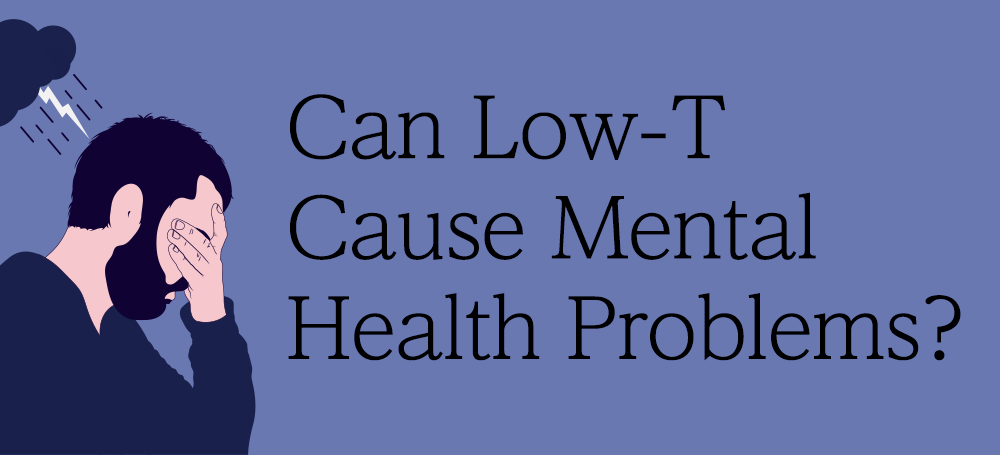The thought of testosterone probably conjures up images and feelings of manliness, of sexual and physical strength — and the idea of low testosterone may prompt thoughts of the opposite.
But did you know that testosterone levels are tightly tied to your emotional and mental health as well? Low testosterone levels are often implicated in mental health conditions such as depression, insomnia, anxiety, and mood swings. Men find that low testosterone levels can impact their lives in many ways not connected to the bedroom or the gym. Treating testosterone deficiency can help push back against these mental health symptoms so you feel emotionally strong again.
How Testosterone Works
The testicles produce the male hormone testosterone, which fuels your sexual function, sperm production, and sex drive and which was responsible for puberty when you reached adolescence. Testosterone also governs everything from hair growth and bone density to the process of building muscle and regulating the distribution of body fat.
It also has a profound affect on your brain and your overall mental health. If your testosterone levels are low, you can experience a wide range of emotional and mental symptoms, including depression.
Causes of Low Testosterone
Testosterone deficiency can be caused by a variety of medical conditions, including testicular injuries, mumps, HIV/AIDS, and tuberculosis. It can also occur when hormones fall out of balance due to weight gain. Certain medications, including opioids and anabolic steroids, can cause the condition, as can chemotherapy and radiation given to treat cancer.
In addition, testosterone drops naturally with age. Beginning at about age 30, men lose testosterone at an average rate of about 1.6% per year. While not all men experience physical, mental, or sexual symptoms with low testosterone, many do.
The Overlap Between Symptoms of Low Testosterone and Mental Health Issues
Because the symptoms of low testosterone can overlap with various mental health conditions, it can be difficult to ascertain the source of the symptoms. Mental health symptoms that can result from low testosterone include:
- Depression
- Irritability
- Low sex drive
- Anxiety
- Difficulties with memory
- Fatigue
- Insomnia
Other Symptoms of Low Testosterone
Of course, mental health symptoms aren’t the only result of low testosterone. The primary symptoms associated with this deficiency lie in the realm of sexual function and desire. Most men with low testosterone experience a marked drop in their sex drive, along with difficulty achieving and sustaining erections.
In addition, men with testosterone deficiency are likely to experience a loss of muscle mass, as well as bone density loss that can lead to osteoporosis. Often they gain weight, especially around the belly. Diabetes and heart disease can also be long-term results of low testosterone.
Mental Health and Low Testosterone
While men do experience decreased levels of testosterone as they age, not all men end up with levels low enough to call a testosterone deficiency. Those who do, however, may find that their moods are affected. These symptoms may be easy to ignore, as they can come on gradually. Often, people attribute their depressed mood to the aging process or to everyday stress, not realizing that they may actually be facing a hormonal imbalance.
Testosterone actually has a direct effect on the brain, which contains testosterone receptors. When these receptors don’t get the amount of hormonal input they need, the result can be mood swings, depression, irritability, and anxiety.
Some people call this “andropause,” seeing it as similar to female menopause. However, menopause comes on suddenly, with a quick, steep drop in female hormones. Men don’t experience the same kind of sudden onset when testosterone level decrease. Instead, the loss comes on very gradually, which often makes it even harder to detect and pin down symptoms.
Any man who is experiencing depression, especially if it hasn’t responded to appropriate medications, should be tested for low testosterone levels. The same is true for men experiencing unexplained mood changes, with an increase in stress and irritability. Take a look at some of the key mental health conditions that can result from low testosterone.
Mood Swings
At one moment, everything feels fine — and the next, you’re feeling overwhelming stressed, distraught, or irritable. You may feel as if you can’t focus on the work you have to do, and you probably can’t point to any obvious reason for the sudden mood shift. Mood swings are also common among men with depression. While they may be prompted by low testosterone, their cause may not be obvious.
Anxiety
Anxiety is one of the mental health disorders that can result in excess production of cortisol by the adrenal glands. That cortisol also affects the male reproductive system, including the testes, where testosterone is produced. When that occurs, the combination of excess cortisol and low testosterone can create an ongoing feedback loop that results in increased anxiety as well as lack of interest in sex.
Fatigue
Yes, your fatigue and insomnia might be the result of working too many hours and not getting enough sleep. But low testosterone can also be the culprit here. And the loss of energy you experience can have further repercussions, leading to the loss of self-confidence that can accompany weight gain. Sleeping difficulties are also often related to depression. In fact, studies show that men who are depressed may have more sleep issues than women.
Depression and Men
Many men who are experiencing depression aren’t even aware of it. That’s in part because men often manifest their depression as anger or aggression rather than as a sense of sadness. Their friends and family — and even their doctors — may not recognize that what they’re seeing are actually signs of depression. In addition, many men are uncomfortable discussing symptoms of depression even with the people closest to them.
Depression in men is a significant concern, however — and all too often, it’s at least in part a result of low testosterone. Signs of depression may manifest as changes in eating habits, sexual function, sleeping patterns, and stress levels — and they should always be investigated.
Low Testosterone and Depression
Because testosterone affects the brain and central nervous system, it also has an effect on mood. In fact, studies show that increased testosterone production can boost the body’s production of serotonin, a neurochemical that affects mood and combats depression.
Other studies link testosterone levels with depression in middle-aged men, with low levels of bioavailable testosterone leading to greater likelihood of depressive symptoms. Still other studies find that 56% of men with borderline levels of testosterone also experience depression — and these men also report other low testosterone symptoms such as low sex drive and erectile dysfunction.
Low testosterone isn’t the only factor involved in depression stemming from chemical imbalances. Other medical problems or genetic predispositions may be involved, as may outside stress, reactions to medication, and other medical conditions. When these other factors combine with low testosterone, the impact can be profound.
In addition, the other symptoms caused by low testosterone can feed into a depressed mood. A man who gains weight and loses muscle mass as a result of testosterone deficiency may find himself less confident than he used to be. He may falter in the romance area due to issues with his sex drive or function — which can spin right back to help cause a greater sense of depression.
Compounding this, men who are taking antidepressants to combat depressive symptoms may experience a decrease in their testosterone levels as a reaction to the medications — which in turn may increase the depressive symptoms. Antidepressents may lower testosterone as much as 30% to 80% in some men.
While low testosterone and depression share a lot of symptoms, a look at the physical symptoms associated with the two conditions can help you figure out what may be going on. Physical symptoms such as decreased muscle mass, decreased strength, and sexual dysfunction point to low testosterone as the culprit in a man’s depression. If physical symptoms manifest as back pain or headaches, the cause of the depression may lie elsewhere. Simple blood tests can help determine what’s really going on.
Testosterone Replacement Therapy and Depression
Fortunately, there’s real hope for men who are suffering from symptoms of depression that are caused by low testosterone. Quite a few clinical trials have been run in recent years to ascertain the effect of testosterone replacement therapy on depression.
These studies show that, yes, testosterone replacement therapy can result in significant reductions in the symptoms of depression in men. These studies indicate that middle-aged men are the most likely to see positive antidepressant effects from this treatment, compared to a placebo. In addition, men whose depression is somewhat less severe may find that testosterone replacement therapy is especially effective.
That’s why testosterone replacement therapy has proven to be a godsend to many men. Instead of taking antidepressants that lower testosterone further or just ignoring the mental health symptoms that seem to have crept up on them, they are able to seek treatment through hormone replacement therapy.
This simple therapy, which is provided only for men whose lab tests confirm low testosterone levels, helps restore testosterone to normal levels. You have many choices when seeking testosterone replacement therapy. Among these are:
- Testosterone injections. This simple method of testosterone replacement lasts a long time — from a week to a month — and you can even administer itself in the privacy of your home. A shot of testosterone goes into the gluteal muscles, and the hormone moves into the bloodstream from there.
- Testosterone gels. These gels can also be applied at home, but care must be taken not to take too much and to keep the gels away from anyone else to avoid overdoses of testosterone. Application is simple, with the gel simply rubbed on the arm every four days or so.
- Testosterone patches. This form of testosterone replacement therapy uses the same type of gel, but applies it in a patch that’s similar to the nicotine patches used by people who want to stop smoking. The patches release constant, small doses of testosterone through the skin over a few days’ time.
- Testosterone pellets. This testosterone replacement method is the longest-lasting, making it ideal for the man who wants to forget about his treatment over a long period of time. Small pellets containing testosterone are placed within the fatty tissue of the buttocks, just under the skin. They go to work silently and slowly, dissolving over a period of three to six months, releasing testosterone all the while.
Your doctor can discuss with you which of these methods is the most appropriate for your lifestyle and your unique needs, as well as which your insurance many cover.
Boston Vitality Can Help
At Boston Vitality, we can answer your questions about the link between depression and low testosterone and provide the testing you need. We are always discreet and confidential regarding any aspect of your health, including testosterone replacement therapy.
Call us at 781-399-LowT (-5698) to start exploring whether your mood swings or other mental health symptoms are a result of testosterone deficiency. We’ll help you find the answers you’re seeking in a warm, understanding atmosphere. With testosterone replacement therapy, you may find that the symptoms of depression you’ve been experiencing start to fade away.


